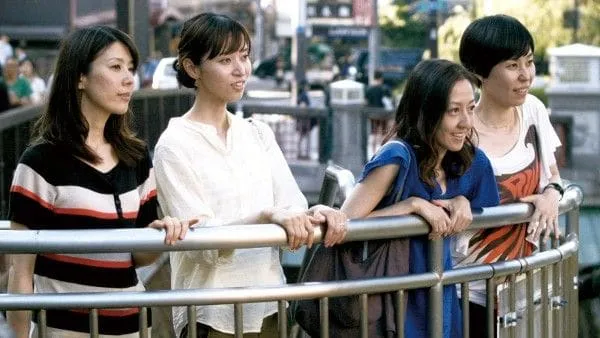Eye For Film >> Movies >> Happy Hour (2015) Film Review
Happy Hour
Reviewed by: Jennie Kermode

In 1945, Japanese law incorporated the principle of gender equality for the first time. It precipitated a change in long established traditional behaviours and relationship structures that was slow at first but which, over the past three decades, has begun to have a dramatic impact on society. Ryûsuke Hamaguchi's five hour epic explores that impact through the lives of four women, observing them over a period of years as an unexpected event prompts them to reconsider their lives and seek different forms of self-determination.
That Hamaguchi is serious about his observational stance becomes clear early on in a half hour scene in which the women participate in a trust-building workshop. It's immediately challenging, transgressing the usual boundaries of polite behaviour toward strangers as the participants are encouraged to touch one another and, in time, to press their backs against one another so that they can stand up without using their hands for support. At first the exercise is conducted in pairs; later, with groups supporting one another. Nevertheless, the focus seems to be on helping people to understand themselves better as individuals. In the aftermath - almost an hour into the film - the climate of trust shows in an unusually open discussion among group participants, and it's then that one of the women, Jun (Rira Kawamura), reveals that she is seeking a divorce.
Divorce has become gradually less stigmatised in Japan in recent years, but some people still find it shocking. In Jun's case it's more so because she openly admits to having an affair, and she seems to feel no shame at all. Nevertheless, the intrusive and deeply sexist court procedures she subsequently goes through elicit sympathy from her friends. What really gets to Akari (Sachie Tanaka), a nurse who seems constantly irritable and is struggling with aspects of her own sexuality, is that Jun didn't tell her bout the affair from the start. She feels that she has been shut out, and this seems to threaten her own sense of stability, emotionally dependent as she is on the friendship group. When Jun disappears without telling her what's going on, she's forced to confront the problems caused by her own idealism.
Meanwhile, Fumi (Maiko Mihara) finds the divorce differently troubling, suspicious as she is about her publisher husband's closeness to a young female writer; and Sakurako (Hazuki Kikuchi) is frustrated by her husband's late hours, one of the most commonly cited reasons for divorce nationally. He's wrapped up in his work and failing to pay her attention; she's wrapped up in confusion over what she might do about it; and neither is paying much attention to their teenage son, who faces his own relationship challenges. The absurdly cute teen couple form a neat counterpoint to the adults and return us to the theme of social change, inhabiting a world where the rules are very different (but where the consequences of mistakes can be just as serious).
Through these overlapping dramas, Hamaguchi explores the deep current of sexism still present in Japanese society, but he is not without sympathy for the men. Although they appear only as supporting characters, the long running time allows plenty of opportunity to detail their reactions to their changing circumstances. The relationship between Jun and her soon-to-be-ex Kohei (Yoshitaka Zahana) is astutely drawn, with the later clinging tightly to traditional notions and completely baffled by his wife's disinterest. Sakurako's husband, meanwhile, seems confounded by the failure of his life to go to plan when he's adhering diligently to the salaryman template.
Quiet and unassuming yet making some devastating points, Hamaguchi's film is shot with deceptive simplicity. Long takes with limited camera movement suggest that the director is simply handing over control to the actors, but closer observation reveals that every scene is carefully controlled, with characters moving in and out of frame to direct and redirect our attention. A rather flat focus in key scenes encourages the viewer to pay attention to what's happening in the background, which has the twin effects of contextualising the action and making the women seem less important even as they gather the emotional and perceptual resources to take control of their own lives. Combined with muted music that might almost be playing in an elevator, this presents the story as a series of incidents almost incidental; but through small glances and brief, cautious words, Hamaguchi conveys volumes.
Reviewed on: 23 Dec 2016
















